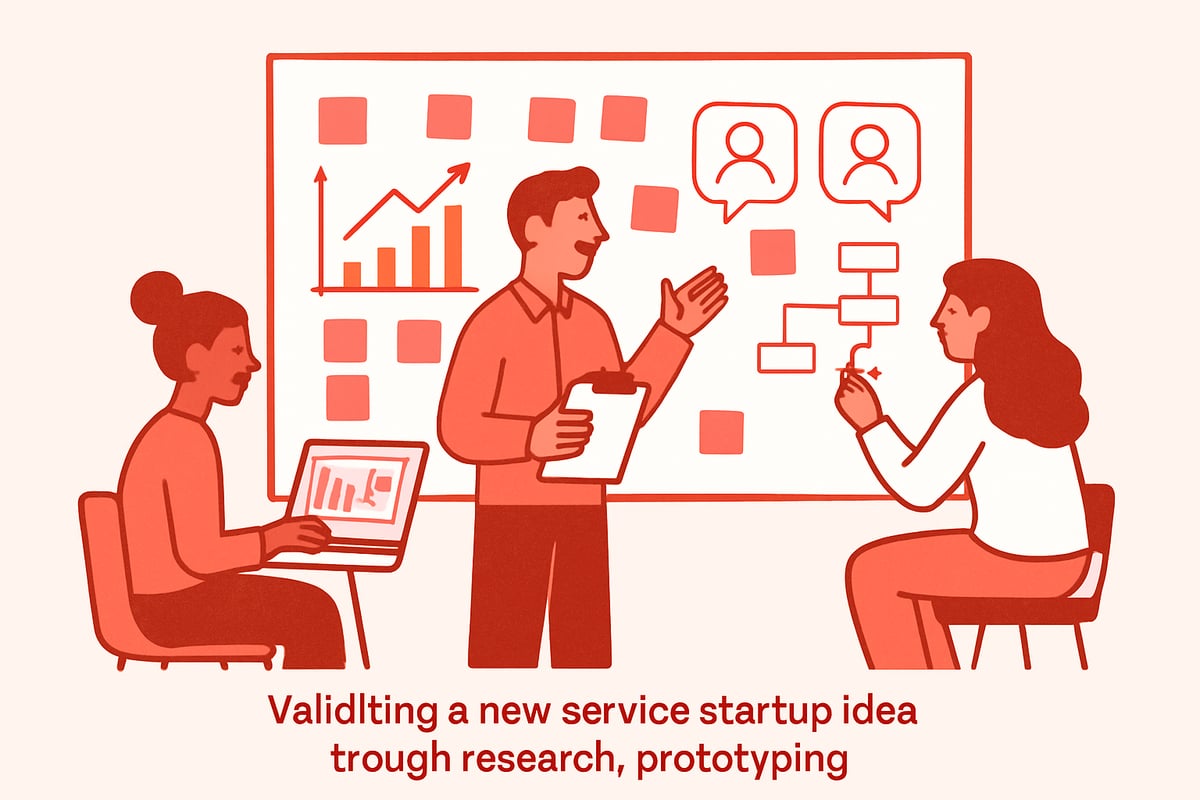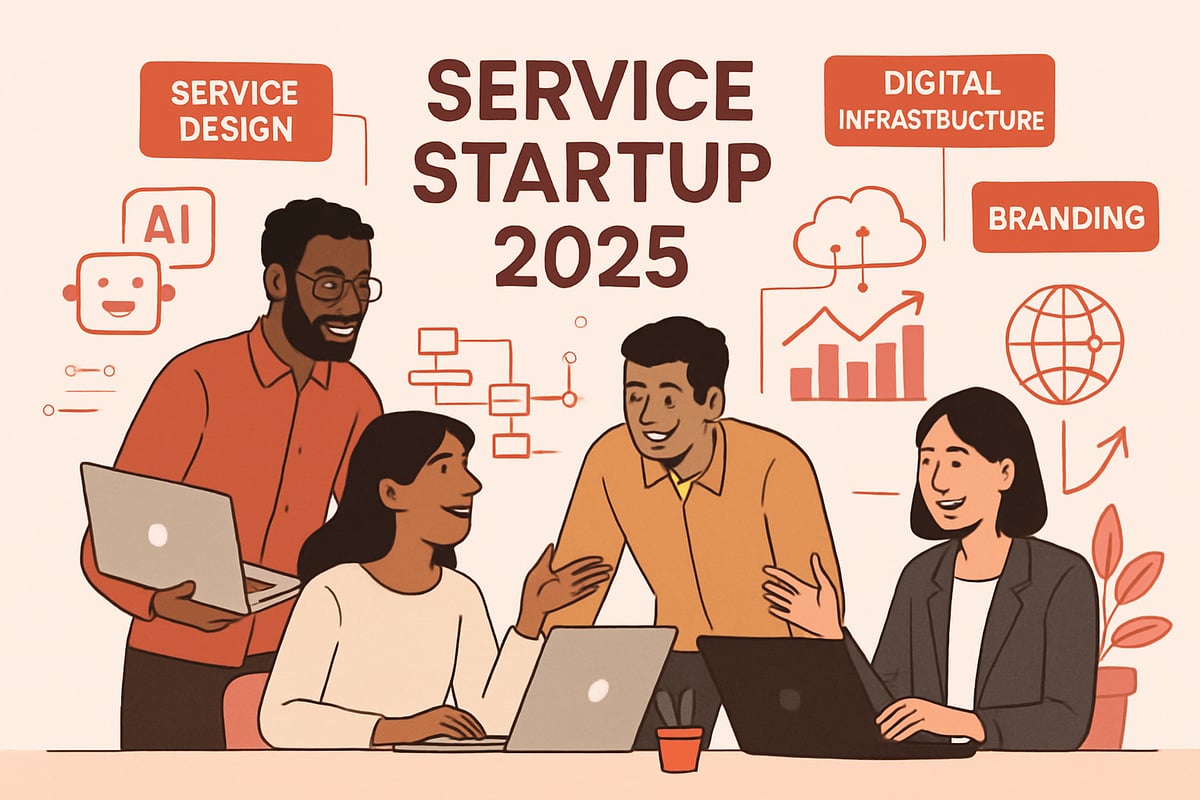Service Startup Guide 2025: Expert Insights for Success
The landscape for launching a service startup in 2025 is bursting with fresh possibilities and unique hurdles. As the service sector speeds ahead, innovative founders face both fierce competition and exciting new markets.
To thrive, you need more than just ambition. You need actionable strategies, insider frameworks, and a clear roadmap. This guide offers expert-backed steps and real-world insights to help you launch, grow, and future-proof your service startup in the year ahead.
Get ready to explore trends, validate ideas, master operations, and harness technology. Let’s dive into a step-by-step journey toward your service startup success.
Understanding the 2025 Service Startup Landscape
The service startup space in 2025 is transforming faster than ever. New technologies, shifting consumer expectations, and global events are rewriting the rules. For founders, this means both increased competition and unprecedented opportunities. Let's break down what you need to know to navigate this landscape and set your service startup apart.

Key Trends Shaping Service Startups
The service startup landscape is being shaped by several powerful trends. Digital transformation is front and center, with AI and automation streamlining service delivery and enabling founders to scale quickly. The shift toward remote and hybrid models means service startups are tapping into global talent pools, leveraging flexibility to drive growth.
Personalization is now a must. Customers expect tailored experiences, making data-driven insights and feedback loops essential. Regulatory changes, especially around data privacy and compliance, are also impacting how service startups operate across borders. Sustainability and ESG concerns are rising, with new ventures expected to prioritize social and environmental impact.
Here's a quick snapshot of top trends:
| Trend | Description |
|---|---|
| AI & Automation | Streamlines operations, boosts efficiency |
| Remote/Hybrid Models | Access to global talent, flexible work |
| Personalization | Data-driven customer experiences |
| Regulatory Changes | New compliance and data privacy standards |
| Sustainability & ESG | Demand for ethical, responsible business |
| On-Demand/Subscription Models | Flexible, recurring revenue streams |
According to industry reports, over 60% of new startups in 2024-2025 are service-oriented. For a deeper dive into these trends, check out this guide on Service Business Trends 2025.
Opportunities and Challenges
With the rapid evolution of the service startup landscape, opportunities abound. Underserved niches are ripe for disruption, especially with digital-first and B2B solutions. The demand for subscription-based and on-demand services is fueling innovation across industries.
However, challenges are significant:
- Market saturation makes differentiation vital.
- Attracting and retaining top talent is more competitive than ever.
- Navigating complex technology stacks can be daunting.
Agility is the name of the game. Founders who can quickly adapt their service startup to market signals and emerging tech will thrive. Consider the example of a service startup that used automation to streamline onboarding and support. By doing so, they reduced operational costs and outpaced traditional competitors.
For every opportunity, there's a corresponding challenge, but the rewards are high for those who move fast and stay customer-focused.
Expert Perspective on the Future
Leading advisors and founders agree: the future of the service startup is rooted in continuous innovation. Staying relevant means listening to customers and acting on feedback. Founders should establish rapid feedback loops and remain open to pivoting their service startup when the market shifts.
Experts also highlight the importance of building resilience. Regulatory landscapes are changing, and customer expectations keep rising. Service startups that invest in learning, technology, and sustainable practices will be best positioned for long-term growth.
In 2025, the line between technology and human touch will blur even further. Successful service startups will harness automation without losing sight of empathy and personalization. As the landscape evolves, adaptability and a relentless focus on value will set winning service startups apart.
Validating Your Service Startup Idea
Bringing a new service startup to life in 2025 means tackling one of the most crucial steps: validation. Before you invest resources or energy, you need to confirm your idea solves a real problem and has market demand. Skipping this process is like building a house on sand—risky and rarely successful.

Market Research and Customer Discovery
Every successful service startup begins with understanding real customer needs. Start by identifying pain points through direct conversations—interviews, focus groups, and even informal chats can reveal what keeps your audience up at night.
Use surveys to gather quantitative data. Dig into competitor analysis to spot gaps in the market. Tools like SWOT analysis and Lean Canvas help you map opportunities and threats, ensuring your service startup isn’t just a copycat.
According to research, 42% of failed startups cite “no market need” as the top reason for shutting down. One founder realized early user feedback indicated a different pain point than expected. By pivoting their service startup quickly, they achieved a strong product-market fit and avoided wasted effort.
Building a Minimum Viable Service (MVS)
Once your research confirms real demand, it’s time to build your Minimum Viable Service (MVS). For a service startup, this means launching the simplest version that delivers the core value to early adopters.
Focus on essential features only—think of it as the “beta” of your service startup. This approach lets you move fast, test assumptions, and gather feedback without overcommitting resources. Balance speed-to-market with quality; your first customers are your best testers, but their experience matters.
Collect early data through signups, usage patterns, and satisfaction surveys. These insights will help you refine your offering and ensure your service startup stands out in a crowded market.
Testing and Iterating
Validation doesn’t stop at launch. For a service startup to thrive, continuous testing and iteration are key. Use rapid prototyping frameworks to tweak your service based on real-world feedback.
Establish clear validation metrics—these could be customer signups, retention rates, or Net Promoter Score (NPS). Track these numbers closely. If you’re not meeting goals, decide if you need to pivot or double down.
Adopt short feedback cycles. The faster you learn, the quicker your service startup adapts to market demands. Remember, flexibility is your secret weapon in the early days.
Avoiding Common Validation Pitfalls
Many founders stumble during validation. Common mistakes include relying too much on anecdotal feedback or testing with a sample that’s too small. Avoid ignoring negative signals—confirmation bias can blind you to real risks.
It’s essential to seek out honest, sometimes uncomfortable feedback. One service startup failed because it dismissed early warnings and pushed forward with an unproven concept.
For practical advice on how to avoid these traps, review the Dos and Don'ts of Startup Idea Testing. It offers step-by-step guidance to help your service startup navigate the validation process with confidence.
Laying the Foundations: Legal, Financial, and Operational Setup
Launching a service startup in 2025 means building on solid ground from day one. The right legal, financial, and operational setup can make or break your journey. Let’s walk through the essential building blocks every founder needs to get started confidently.

Choosing the Right Legal Structure
Selecting the appropriate legal structure is a critical first step for any service startup. Your choice impacts liability, taxes, and growth potential. Common options include LLC, GmbH, and sole proprietorship.
Here’s a quick comparison:
| Entity Type | Pros | Cons |
|---|---|---|
| LLC | Limited liability, flexible | More paperwork, costs |
| Sole Proprietorship | Simple setup, full control | Personal liability, tax risk |
| GmbH | Strong legal protection | Higher capital requirement |
Regulatory considerations are especially important for international service startup founders. Cross-border operations often mean additional compliance around data privacy and local laws.
For more details on essential legal steps, refer to Legal Basics for Startups, which covers the core requirements you’ll need to address from day one.
Financial Planning and Funding
A robust financial foundation is non-negotiable for a thriving service startup. Begin by estimating your startup costs, projecting cash flow, and identifying your break-even point. This helps you avoid unpleasant surprises as you grow.
Funding options include:
- Bootstrapping with personal savings
- Angel investors and venture capital
- Government grants and startup competitions
A notable example: One service startup used a lean budget and careful cash management to achieve profitability within its first year. The key was prioritizing essential expenses and reinvesting early revenue into growth rather than overhead.
Forecasting and planning create clarity, helping your service startup weather unexpected storms and seize new opportunities.
Setting Up Operations and Technology
Operational efficiency is a cornerstone for any service startup. Start by selecting tools that streamline project management, CRM, and team communication. Popular choices include Trello, Slack, and HubSpot for seamless workflows.
Don’t neglect cybersecurity. Protecting client data is vital, especially as regulations tighten. Invest in secure platforms, strong passwords, and regular audits.
To scale your service startup, document processes for onboarding, service delivery, and customer support. This ensures consistency and lets you delegate or automate as you grow.
Building these foundations now saves countless headaches later and positions your service startup for smooth scaling.
Hiring and Building Your Team
Your team is the heartbeat of your service startup. Attracting top talent in 2025 means competing for skilled professionals who value flexibility. Consider remote, in-house, and hybrid models.
Let’s compare:
- Remote teams: Wider talent pool, lower overhead, but challenges with communication.
- In-house teams: Closer collaboration, easier culture-building, but higher costs.
- Hybrid: Balance of both, offering flexibility and structure.
Strategic outsourcing can accelerate growth. One service startup scaled rapidly by partnering with specialized freelancers for non-core roles, freeing core staff to focus on high-impact projects.
Invest in hiring and team-building early. A strong team enables your service startup to innovate, adapt, and thrive in a competitive market.
Step-by-Step Guide: Launching Your Service Startup in 2025
Launching a service startup in 2025 can feel like navigating a fast-moving river. Each step requires clarity, agility, and a clear sense of purpose. This guide breaks down the journey into actionable phases, helping you move from idea to thriving business.
Whether you’re just sketching your concept or already building your team, these steps will help you build a service startup designed for success in a rapidly changing market.

Step 1: Define Your Service Offering and Value Proposition
Start by pinpointing what makes your service startup unique. Ask yourself: What problem do you solve, and who truly needs your solution?
Craft a value proposition that speaks directly to your target audience’s pain points. Consider how you’ll differentiate—will it be through pricing, features, or a standout guarantee? For example, one service startup in the home cleaning industry offered a "reclean for free" promise, building instant trust.
If you’re unsure where to start, check out this comprehensive How to Start a Business resource for foundational steps and inspiration.
A strong value proposition is your north star. It guides every decision, from branding to customer experience, keeping your service startup on track.
Step 2: Set Up Digital Infrastructure and Tools
Your digital foundation is critical. Choose a website platform that’s easy to update and mobile-friendly. Integrate booking and payment systems for seamless customer transactions.
Automation is your ally. Most service startup founders automate scheduling, invoicing, or client communication by year two. Tools like Calendly or Stripe can handle bookings and payments, while CRM systems keep your pipeline organized.
Prioritize cybersecurity from day one. Protecting client data builds trust and keeps your service startup compliant with regulations.
Step 3: Develop Your Go-to-Market Strategy
Identify your ideal customers and decide how you’ll reach them. Will you focus on LinkedIn outreach, content marketing, or partnerships?
Map out a launch plan with clear milestones. For instance, one service startup founder landed their first 100 clients through targeted LinkedIn campaigns and strategic networking.
Use storytelling to showcase your service startup’s impact. Highlight early wins and customer testimonials to build credibility quickly.
Step 4: Establish Operations and Service Delivery Processes
Consistency and scalability are vital as your service startup grows. Standardize workflows for onboarding, delivery, and follow-up.
Implement feedback loops so you can learn and adapt. Tools like Trello or Asana help manage tasks and track progress. Set key performance indicators (KPIs) to measure quality and spot bottlenecks.
A well-oiled operations engine ensures your service startup delivers value every time, building loyalty and word-of-mouth referrals.
Step 5: Build Your Brand and Online Presence
Your brand is more than a logo—it’s how people feel about your service startup. Develop a memorable identity and craft messaging that resonates with your audience.
Leverage SEO to boost visibility. Share success stories, encourage reviews, and showcase testimonials for social proof. Reputation management is crucial in the service industry, where trust drives decisions.
A strong online presence ensures your service startup stands out in a crowded marketplace.
Step 6: Launch, Monitor, and Optimize
Kick off with a soft launch or beta phase. Invite early adopters to provide feedback and iterate quickly. Use analytics tools to track performance and customer satisfaction.
Monitor what’s working and what’s not. Adjust your service startup’s features or processes based on real data, not just gut feelings.
Continuous optimization keeps your service startup agile and responsive to market shifts.
Step 7: Prepare for Growth and Scaling
Think ahead. As demand increases, plan for staffing, automation, and strategic partnerships. One service startup scaled nationally within 18 months by forming alliances with complementary businesses.
Document processes so new team members can hit the ground running. Invest in tools that support growth without sacrificing quality.
A growth mindset ensures your service startup is ready for new opportunities, no matter how quickly the market evolves.
Automation, Technology, and Efficiency in Modern Service Startups
In 2025, automation and technology are not just buzzwords—they are the backbone of every successful service startup. Founders who understand how to harness these tools gain a clear edge, transforming efficiency, customer experience, and profitability. Let’s break down how modern service startups can thrive by making smart tech choices.
Harnessing Automation for Competitive Advantage
Automation is the great equalizer for any service startup. By automating routine tasks like onboarding, scheduling, billing, and customer support, founders can reclaim time and focus on growth.
- Automate appointment bookings and reminders to minimize no-shows.
- Use workflow tools to streamline project handoffs and reduce manual errors.
- Implement automated billing for faster payments and improved cash flow.
For example, one service startup reduced operational costs by 30% simply by automating its client onboarding and invoicing. The right automation tools can help any service startup scale faster, deliver consistent results, and compete with larger players. Here’s a quick comparison of automation tools:
| Function | Popular Tools | Benefit |
|---|---|---|
| Scheduling | Calendly, Acuity | Reduces admin work |
| Billing | Stripe, FreshBooks | Accelerates payments |
| Support | Zendesk, Intercom | 24/7 customer service |
Automation frees up your team and ensures your service startup delivers at the highest standard, every time.
Leveraging AI and Data Analytics
Artificial intelligence is rapidly becoming a must-have for any service startup aiming to personalize experiences and make smarter business decisions. AI-driven chatbots can resolve client queries instantly, while predictive analytics help you understand customer needs before they even ask.
Service startups using AI often report double the growth rates, as they can anticipate trends and optimize operations. For deeper insights into how AI is transforming the landscape, check out the 2025 Startup Trends for CEOs. Data analytics also plays a pivotal role—tracking customer satisfaction, retention, and engagement helps your team refine services continuously.
Imagine using AI to recommend tailored service packages or predict churn risk. By harnessing these capabilities, a service startup can stay ahead of competitors and deliver unmatched value.
Integrating with Ecosystems and Third-Party Services
Modern service startups don’t operate in isolation. APIs and third-party integrations are essential for creating seamless client experiences. Whether it’s connecting your CRM to marketing tools, or integrating payment gateways, these connections save time and reduce errors.
- Plug-and-play integrations with SaaS platforms streamline workflows.
- Connecting your service startup’s software stack boosts productivity.
- Automated data syncs ensure information is always up to date.
Industry leaders are prioritizing integrations for scalability and sustainability. For more on how industry solutions are shaping the future, see Startup Industry Trends 2025. By building a tech ecosystem, your service startup can pivot quickly and adapt to market shifts.
Balancing Technology with Human Touch
While automation and AI drive efficiency, the human element remains crucial in every service startup. Clients want to feel valued, not just processed. Technology should enhance—not replace—the personal connection.
- Use automation for repetitive tasks, but keep complex support human-led.
- Personalize communications with data-driven insights.
- Encourage feedback loops to maintain trust and loyalty.
The most successful service startups blend high-tech tools with authentic, empathetic service. This balance ensures clients remain loyal and your brand stands out in a crowded market.
Expert Insights: Lessons Learned and Pro Tips for Service Startup Success
Launching a service startup in 2025 offers extraordinary potential, but every founder faces a steep learning curve. Industry leaders agree: success is rarely a straight line. By examining common pitfalls, growth strategies, and future-focused advice, you can sidestep costly errors and build a resilient, thriving business.
Common Mistakes and How to Avoid Them
Even the most innovative service startup can stumble if early missteps go unchecked. Here are errors founders often make:
- Underestimating how complex service delivery can become as clients multiply.
- Focusing only on acquiring new customers instead of nurturing existing ones.
- Over-engineering processes before validating the market.
Avoiding these mistakes means investing in robust onboarding, prioritizing client retention, and keeping workflows lean until you have product-market fit. Each service startup that learns from these missteps gains a stronger foundation.
Keys to Sustainable Growth
Sustainability isn’t just about rapid scaling—it’s about building a service startup that endures. Focus on these pillars:
| Growth Pillar | Why It Matters |
|---|---|
| Recurring Revenue | Predictable cash flow |
| Client Loyalty | Lower churn, higher referrals |
| Team Learning | Adapts to changing market needs |
| Operational Agility | Responds fast to new opportunities |
A service startup thrives when it prioritizes customer experience and cultivates a culture that embraces ongoing improvement.
Advice from Industry Leaders
Top founders recommend seeking mentorship, networking with peers, and leveraging the latest market intelligence. Staying plugged into the broader ecosystem means you’re always learning and ready to pivot. Many industry leaders stress the value of community support, especially when navigating uncertainty.
To keep your service startup ahead of the curve, explore the Startup Ecosystem Trends 2025 for insights on AI, remote work, and evolving customer expectations.
The Path Forward in 2025
Looking ahead, the most successful service startup founders are those who embrace change and invest in technology. Listen closely to your customers, iterate quickly, and focus on delivering measurable outcomes. Adaptability and a relentless drive for value creation will set your venture apart.
Take action by building feedback loops, tracking your metrics, and staying curious. With the right mindset and strategies, your service startup can not only survive but lead the market in 2025.
If you’re feeling inspired by these expert insights and ready to take your own service startup to the next level, you don’t have to navigate the journey alone. The Swiss startup ecosystem is full of passionate founders, mentors, and innovators who understand the challenges you’re facing—because they’ve been there too. If you want to connect with like-minded entrepreneurs, share experiences, and unlock resources designed just for Swiss founders, I encourage you to apply to our swiss founders community. Let’s build something remarkable together!

